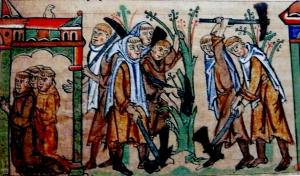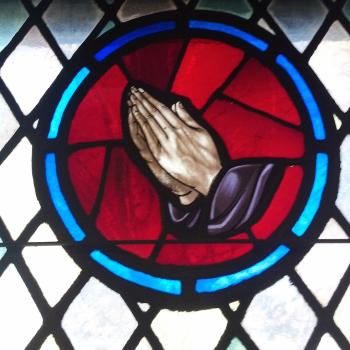
Many legends of magical faeries coming out at night helping poor villagers with their needs could, in some fashion, have been inspired by the charitable work of various monks and nuns, and others like them, who liked to help those in need without being seen. We can read, for example, a story of one such monk in the Spiritual Meadow. No matter where he lived, he took the opportunity given to him to help those who needed it, doing whatever was necessary, even if it meant working manual labor at night. Some people, waking up in the morning, would find their farms had been attended overnight, as if some beneficial spirit was taking care of them. At other times, he did not hide his charitable work: if the need was great, it was more important to do the work than to preserve his secret. Central to it all was that he felt great love for his neighbors, which is why he made taking care of their needs a major part of his spiritual practice:
There was an elder living at the Cells of Choziba and the elders there told us that when he was in his <home> village, this is what he used to do. If ever he saw somebody in the village so poor that he could not sow his own field, then, unknown to the man who worked that land, he would come by night with his own oxen and seed – and sow his neighbour’s field. When he went into the wilderness and settled at the Cells of Choziba this elder was equally considerate <of his neighbours>. He would travel the road from the holy Jordan to the Holy City <Jerusalem> carrying bread and water. And if he saw a person overcome with fatigue, he would shoulder that person’s pack and carry it all the way to the holy Mount of Olives. He would do the same on the return journey if he found others, carrying their packs as far as Jericho. You would see this elder, sometimes sweating under a great load, sometimes carrying a youngster on his shoulders. There was even an occasion when he carried two of them at the same time. Sometimes he would sit down and repair the footwear of men and women if this was needed, for he carried with him what was needed for that task. To some he gave a drink of the water he carried with him and to others he offered bread. If he found anyone naked, he gave him the very garment he wore. You saw him working all day long. If ever he found a corpse on the road, he said the appointed prayers and gave it burial. [1]
Even though he had become a monk, and in some ways, retreated from the world, he did so, not because he rejected the world and the people within it, but rather, to follow the example of Christ who went out into the desert for a spiritual retreat before engaging those in need. He understood his monastic call did not mean he should ignore his obligations to his neighbors; indeed, understood those who became monks were expected to find creative ways to show their charitable love to others. He made sure, when he encountered people in need, he did what he could to help satisfy those needs. He provided food and drink, spiritual and material comfort, even if it meant he would find himself at a loss. By giving his clothing to those who were naked showed he was even willing to take on the burdens and shame of others so that they did not have to. He knew that some, if they saw him going around naked, or at least, without his monastic garb, would question his sanity if not his moral integrity, but he did not seem to care. It was more important for him to give to others what they needed than it was for him to consider himself and his honor. In following such a practice, he did not disengage himself from his ascetic discipline, and the spirituality which could and is had be being a monk, but rather, he realized that he could be actively involved with charitable works will finding a way to pray without ceasing. By embracing a life of prayer, he did not have to engage a life of inactive quietude.
We can learn a lesson from his way of life: no matter who we are, no matter what situation we find ourselves in, we should embrace the example he gave us. We should live our lives always ready to give to others what they need. We should love them, no matter what others think of them or us if we do so. And it is in and through such charity, we can find our spiritual life improved. For if we want to embrace a life of prayer, if we want to learn how to pray without ceasing, we need to find a way to do so which includes being active in the world. Indeed, charitable acts, in and of themselves, can be and should be seen as forms of prayer, as in and through them, we are showing honor to the image and likeness of God in those we help. We might not have the skills or goods everyone needs when we encounter them, but we have ourselves, and we can and should give them the gift of ourselves. We should be willing to be there for them, listening to them if they need someone to give them an ear, showing care and compassion, especially to those who otherwise feel they have no one who cares for them.
What is also important is that this elder shows us that we can and should discern our situation in life, the context in which we find ourselves, and look for the opportunities we have to live out our life in a life of charity based upon our own place in the world. He was a monk, someone who lived, in some ways, apart from the world, and yet he did not abandon the world and the people in it. He helped people the best he could, and in doing so, he showed the true spirit of monasticism, which is not one of extreme discipline for the sake of discipline itself, but rather, it is of the spirit of discipline for self-development so that one can become a better person in the world. And he did so by finding out how he could and best life his life in accordance to the place he found himself in, as ascetic literature also implored its readers to do:
An elder said: “If one inhabits a place but does not produce the fruit of the place, the place chases him off for not performing the task of the place.” [2]
This is true for ourselves as well. We might not be monks or nuns, but there are all kinds of opportunities which come our way which we should embrace. If we do so, we will find our lives bettered. If, on the other hand, we find they are coming our way, or we don’t embrace them when they do, we will find things will become very difficult for us; such difficulty should prove that we should either change our ways, or move to find a place which is more appropriate for us and our skills. For, it is often suggested (from the experiences of many), that if we are where we should be, we will know by how right everything thing seem to be, but if we are not, we will find it difficult to do anything we should want, as everything will seem to be getting in our way, preventing us from finding peace in our lives. Then, if that is the case, we need to decide to either change our ways or to move on, to find where we truly belong.
[1] St. John Moschos, The Spiritual Meadow. Trans. Jon Wortley (Collegeville, MN: Cistercian Publications, 1992; repr. 2008), 16 [#24].
[2] John Wortley, trans., The Anonymous Sayings Of The Desert Fathers: A Select Edition And Complete English Translation (Cambridge: Cambridge University Press, 2013), 171 [N247/10.113].
Stay in touch! Like A Little Bit of Nothing on Facebook.
If you liked what you read, please consider sharing it with your friends and family!
N.B.: While I read comments to moderate them, I rarely respond to them. If I don’t respond to your comment directly, don’t assume I am unthankful for it. I appreciate it. But I want readers to feel free to ask questions, and hopefully, dialogue with each other. I have shared what I wanted to say, though some responses will get a brief reply by me, or, if I find it interesting and something I can engage fully, as the foundation for another post. I have had many posts inspired or improved upon thanks to my readers.













